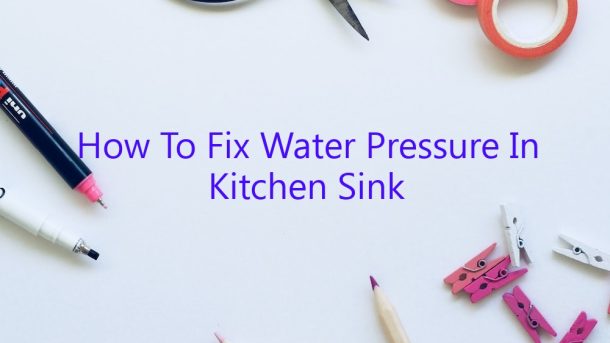Water pressure is an important factor when it comes to kitchen sinks. You need it to be strong enough to get the job done, but not so strong that it’s difficult to control. If your water pressure is weak, inconsistent, or nonexistent in your kitchen sink, there are a few things you can do to fix it.
One common cause of low water pressure is a clogged aerator. The aerator is the small screen on the end of the faucet that mixes the water with air. If it’s clogged with sediment or debris, it can significantly reduce the water pressure. To clean it, remove the aerator from the end of the faucet and soak it in vinegar overnight. If the clog is stubborn, use a toothbrush to clean it out.
Another common cause of low water pressure is a low water pressure regulator. This is a small, threaded valve that’s located on the incoming water line. If the water pressure is too high, it can damage the fixtures and appliances in your kitchen. The pressure regulator can be adjusted to correct the problem.
If the water pressure is low all the time, even when the water is turned on full blast, the problem may be with your water main. In this case, you need to call a plumber to investigate and correct the problem.
If you’ve tried all of these solutions and your water pressure is still low, it may be time to consider a new kitchen faucet. There are many faucets on the market that are designed to work with low water pressure, and they can be a quick and easy solution to your problem.
Whatever the cause of your low water pressure, there are a number of solutions that can correct the problem. Try one of these solutions and see if it works for you.
Contents
Why do I have low water pressure in my kitchen sink?
If you’re experiencing low water pressure in your kitchen sink, there are a few things you can do to troubleshoot the issue.
First, check the water pressure at the spigot closest to the kitchen sink. If the water pressure there is normal, the problem is likely with the sink itself.
Next, check the water pressure at the hot and cold water faucets in the kitchen. If the water pressure is normal at both faucets, the problem is with the sink’s sprayer head.
If the water pressure is low at the faucet but normal at the sprayer head, the problem is with the aerator on the faucet. You can try cleaning the aerator or replacing it with a new one.
If the water pressure is low at the faucet and the sprayer head, the problem is likely with the water pipes. You may need to have the pipes inspected and repaired.
How do I increase the water pressure in my kitchen sink?
There are many reasons why you might want to increase the water pressure in your kitchen sink. Maybe the water pressure is too low and it’s difficult to get the dishes clean. Maybe the water pressure is so high that it’s difficult to control the flow. Or maybe the water pressure is just right, but you want to make sure that it stays that way.
Fortunately, there are a few ways that you can increase the water pressure in your kitchen sink. One way is to adjust the water pressure regulator on your faucet. Another way is to install a water pressure booster pump. And yet another way is to install a new faucet that has a higher water pressure rating.
If you’re not sure how to adjust the water pressure regulator on your faucet, or if you’re not sure how to install a water pressure booster pump, or if you’re not sure which faucet to buy, then you might want to consult a plumber. A plumber can help you increase the water pressure in your kitchen sink in a way that is safe and effective.
Why is water barely coming out of faucet?
There are a few reasons why your faucet might not be giving out as much water as you’d like. One common problem is a worn-out washer. If this is the case, you might be able to fix the issue by yourself. Other reasons for low water pressure might include a kinked hose, a clogged valve, or a problem with your municipal water supply. If you’ve tried troubleshooting and can’t seem to identify or fix the problem, it’s best to call a professional.
Why is my kitchen tap running slow?
There could be a few reasons why your kitchen tap is running slow. One common reason is a build-up of lime scale on the tap head. This can be caused by hard water, and over time it can clog up the tap and slow the water flow.
Another possibility is that the tap aerator is dirty or clogged. The aerator is the small screen at the end of the tap that mixes air with the water, and if it’s dirty it can slow the flow of water.
If you have a compression faucet, the washers may need to be replaced. Over time, the washers can become worn and cause the faucet to leak or run slowly.
If you’ve tried all of the above and your tap is still running slowly, it may be time to call a plumber to take a look.
How do I increase water pressure in my faucet?
There are a few ways that you can increase the water pressure in your faucet. One way is to check and see if the faucet is clogged. If the faucet is clogged, you can clear the clog by using a plunger or a wire brush. Another way to increase the water pressure is to replace the faucet aerator with a new one. The aerator is the part of the faucet that mixes air with the water. If the aerator is clogged, it can reduce the water pressure. You can also increase the water pressure by increasing the water pressure in your home.
Why do I suddenly have low water pressure?
There are a few reasons why you may suddenly experience low water pressure in your home. One common reason is a leak in your water line. If there is a leak, it will cause your water pressure to decrease since less water will be making it to your faucet. If you suspect that you have a leak, you can test for it by turning on all of your faucets and watching your water meter. If the meter is spinning, you likely have a leak.
Another common reason for low water pressure is a clogged water line. If there is something blocking the flow of water, the pressure will be reduced. This could be anything from a build-up of sediment to a tree root invading the line. If you suspect that your water line is clogged, you can try clearing it yourself using a plunger or a plumbing snake. If that doesn’t work, you may need to call a professional to clear it for you.
Finally, low water pressure can also be caused by a problem with your water heater. If the water heater isn’t producing enough hot water, the pressure will be reduced. You can test to see if this is the problem by running the hot water for a few minutes. If it doesn’t get hotter, the water heater is likely the issue. If this is the case, you may need to have it serviced or replaced.
Can air in pipes cause low water pressure?
Can air in pipes cause low water pressure?
The answer to this question is yes, air in pipes can cause low water pressure. This is because when air is in the pipes, it takes up space and limits the amount of water that can flow through the system. This can cause issues with water pressure and can lead to problems such as water shortages.
There are a few ways to troubleshoot low water pressure caused by air in the pipes. One way is to bleed the system. This is done by opening a valve at the top of the system to release the air. Another way to address the issue is to use a pump to push the water through the system.
If you are experiencing low water pressure caused by air in the pipes, it is important to take action to address the issue. This can help ensure that you have the proper amount of water pressure for your needs.




